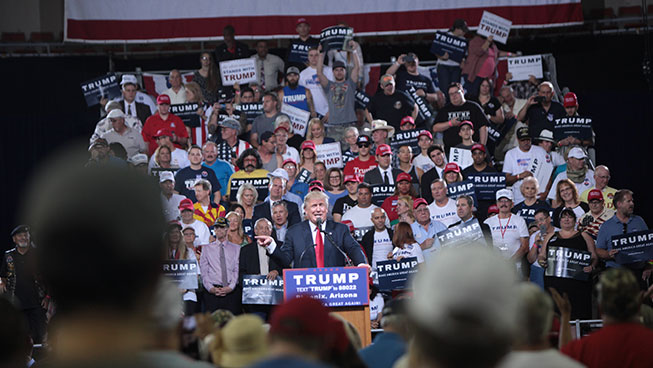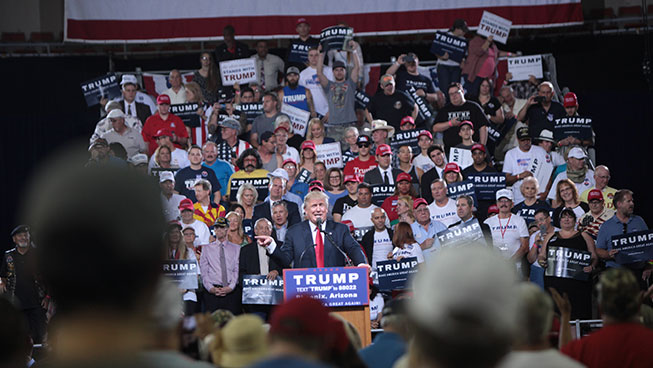
Photo Credit: Gage Skidmore/Flickr
Trump is the symptom; racism is the sickness.
By Kali Holloway / AlterNet
I know enough about this country to know that Donald Trump is not a fluke. I know that Trump is not really un-American, not if we’re talking about what America actually is as opposed to what it pretends to be. Forget about emails and Russian hacking and James Comey and the beer test, forget uselessly relitigating the election ad infinitum. Almost 63 million people voted for Donald Trump, a man who never even tried all that hard to pretend he was moral or cared about politics or held democracy in anything other than contempt. Those ballots were reimagined as tickets to a virtual time machine, and mostly cast by people desperate to quell the insecurities and self-doubts roused by having the innate supremacy of whiteness questioned. Call your senators, march a thousand miles, filibuster like it’s going out of style; by all means resist every regressive policy this regime proposes. But please never be dishonest enough to believe there will not be more Trumps—maybe many, possibly worse—until this country properly reckons with racism and white supremacy.
This president isn’t an original; he’s just the most recent proof of America doing the same thing over and over again and pretending not to want the same result. Trump is the vast measurable difference between what America claims it wants to be and the truth. The U.S. advertises a vision of itself as an imperfect nation struggling to rehabilitate its racist tendencies, to right grievous historic wrongs, to live up to all the empty promises inscribed in its governing documents. It’s an image that is not just hamfistedly contrived but deeply dishonest. Most white Americans don’t want racial equality, and were they as publicly honest about race as they are in the voting booth, they would admit they reject America’s self-reported ideals. Racial justice would fundamentally depreciate the market value of whiteness as an inborn asset and leg up on the competition. Determined to protect it, whites overwhelmingly voted to elect a man who violates every code of common human decency.
What else but the endless dividends of whiteness allows white Christians, now and historically, to live with the cognitive dissonance of promoting racism, Native genocide and Jesus at the same time? Every class, gender and educational level of whites went for Trump (except white college-educated women), but no other demographic brought in the numbers white Christians did. The group that for eight years questioned Obama’s religious beliefs came out in droves for a twice-divorced serial philanderer who boasts about criminal sex acts, hints that incest laws are hampering his dating life and has made his surname synonymous with greed. The bonus is that during the campaign, when asked whether he was “an Old Testament guy or a New Testament guy,” Trump answered, “Probably equal.” When prodded to recite his favorite Bible verse, he responded, “Well, I think many. When we get into the Bible, I think many, so many.”
Ted Cruz, a preacher’s son, and Mike Huckabee, a minister, played the racism card plenty, but with perceived threats to white supremacy at code-red levels, white Christians still overwhelmingly voted for Trump. According to the Public Religion Research Institute, 81 percent of white evangelicals, 60 percent of white Catholics and 61 percent of Mormon voters supported Trump, “despite their evident concerns about his political policies and character.” Those voters basically copped to their desire to maintain white power, with three out of four white evangelicals—more than any other racial or religious group—saying “American culture has changed for the worse since the 1950s.”
White liberals found easy scapegoats for Trump’s election in black folks, who voted for Hillary Clinton in higher numbers than any other demographic. Now facing attacks on their civil rights and safety that people of color have always lived with, too many white leftists decided the right response was to push back against equality. They promoted a narrative suggesting people of color, LGBT folks and women had let their demands—to be seen as human beings—get in the way of the good of the country. In the weeks after the election, these white leftists called for an end to “identity politics,” perhaps unaware that U.S. political history has largely been about nothing but straight-up identity politics centered on white men. It wasn’t until a few other identities sought to share that power that the concept became problematic.
Make no mistake: this is a concession to white racists, a co-signing of white supremacy and a step toward normalization of everything Steve Bannon is trying to make law. It propped up the idea that whiteness is the normal default; that non-whites are raced while whites just are. The first thing to go in a moment of perceived crisis and threats to white liberal quality of life is the fight for equality, even if in that same moment people of color are being violently targeted for their identities. Only white privilege asks marginalized folks not to defend their right to be at a time when the identity politic most in need of refutation is white supremacy.
White suffragettes demanded black suffragettes walk at the back of their parades, and Susan B. Anthony said she would “cut off this right arm of mine” before she’d fight for black folks to get the vote ahead of white women. There’s a direct line connecting that history with today’s protests, filled with white men and women—who, let it never be forgotten, also overwhelmingly supported Trump—who never felt motivated to march before their own rights seemed in peril. To paraphrase activists Rosa Clemente and Tef Poe, there’s no shortage of black and brown poor people living in Trump’s America no matter who’s in charge. Please, don’t confuse these facts with the disparagement of collective action. Spilt milk being what it is, this is no time for standing down and keeping quiet. But while you are in the streets, remember that even so-called progressive activism in this country has had white supremacy as its goal. That’s still true.
So is this: With each movement—each symbolic gesture, however hollow—toward racial progress, white people are too ready, too eager to act like we somehow got over without dealing with that whole mess. The last time around was embodied in Barack Obama, but he wasn’t the first and there will be others; there’s a reason this is called the Third Reconstruction. Trump’s kakistocracy may well end up being such an abject failure (mostly meaning it will not fulfill its promises to the white people who voted for him) that it creates space for the rise of a voice so far out of the political mainstream it’s hard to conceive of it yet. That will be a change for the better, and it will be cut short by by millions of petrified white Americans making moral and political compromises to pedal backwards. By refusing to grapple with white supremacy, be assured that for every two steps forward, there will always be a guarantee of being shoved three steps back again.
Kali Holloway is a senior writer and the associate editor of media and culture at AlterNet.















